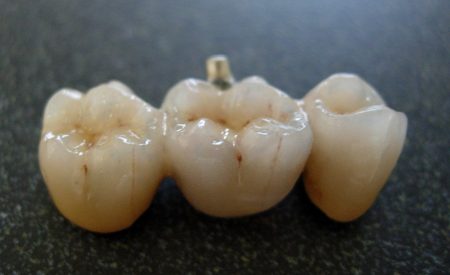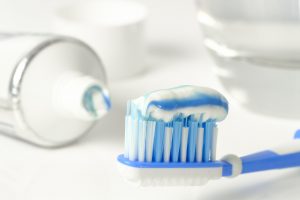
Sugar is an enemy to your teeth because when it combines with the filmy plaque that coats your teeth, it creates the acid that can erode enamel and begin tooth decay. Depending on any number of factors, the plaque can remain acidic for up to an hour. After that time, the plaque will begin to return to neutral and the danger will pass.
The amount of sugar you consume may, in the long run, be less significant than the way you consume it. Dessert at the end of a meal, say, followed by a brushing and flossing, minimizes the exposure of teeth to sugar. Consuming sugary products throughout the day, however, can keep your teeth in a bath of sugar. Sucking on a slow-dissolving hard candy, for instance, keeps your teeth in long-term contact with acid. Sugary drinks like soda are even more damaging because they are already very acidic.
Aside from its effect on teeth, sugar consumption contributes to a variety of human health problems, including obesity. Talk with your dentist about how to prevent sugar from being a problem for you.
If you, your family or friends need dental care, we would be honored to provide you with state-of-the-art dental care in our modern dental practice. Refer someone you love to someone you trust!
Presented as a service to the community by Doctors Hoover and Yanda,
39 Milford Drive, Hudson, Ohio 44236. 330-650-0360. www.drshooverandyanda.com






 Is a spoonful of ice cream or a sip of hot coffee sometimes a painful experience for you? Does brushing or flossing make you wince occasionally? If so, you may have sensitive teeth. Possible causes include:
Is a spoonful of ice cream or a sip of hot coffee sometimes a painful experience for you? Does brushing or flossing make you wince occasionally? If so, you may have sensitive teeth. Possible causes include: them over a prolonged period and holding them in the mouth is not good. The acid dissolves minerals in the enamel, making it thinner.
them over a prolonged period and holding them in the mouth is not good. The acid dissolves minerals in the enamel, making it thinner. Did you know that the average adult between the ages of 20 and 64 has three or more decayed or missing teeth? If you are missing one or more teeth, there are plenty of reasons to correct the problem. For one thing, a large space between your teeth may affect how you speak or eat. Even if it’s not noticeable, a missing molar can affect how you chew. Remaining teeth may shift which can lead to tooth decay and bone loss.
Did you know that the average adult between the ages of 20 and 64 has three or more decayed or missing teeth? If you are missing one or more teeth, there are plenty of reasons to correct the problem. For one thing, a large space between your teeth may affect how you speak or eat. Even if it’s not noticeable, a missing molar can affect how you chew. Remaining teeth may shift which can lead to tooth decay and bone loss. 